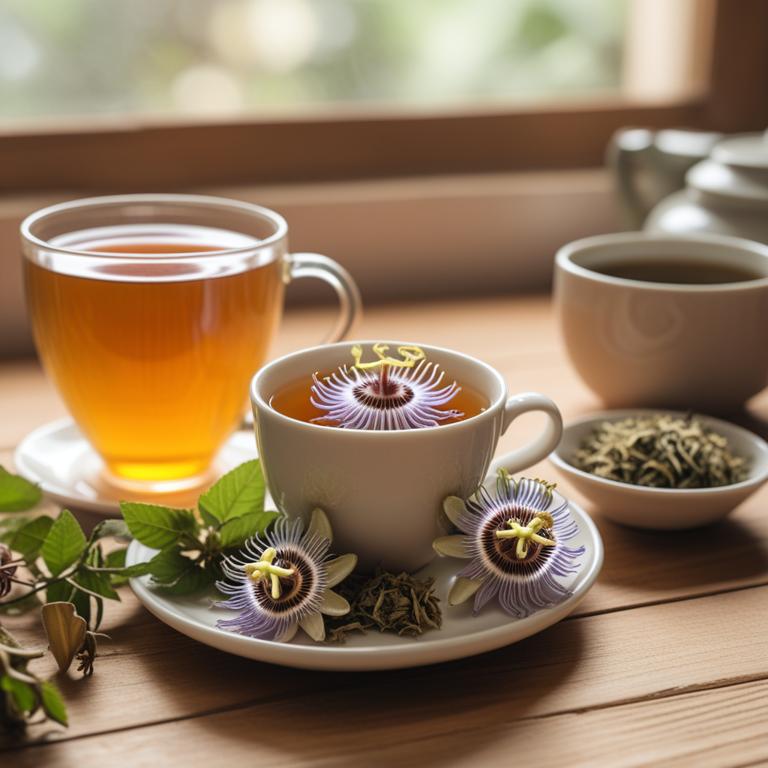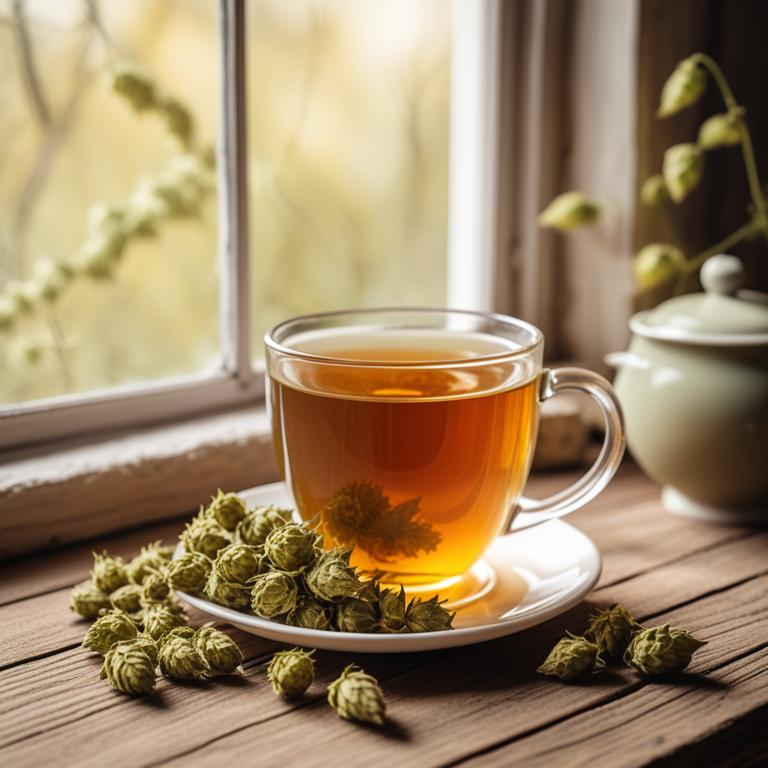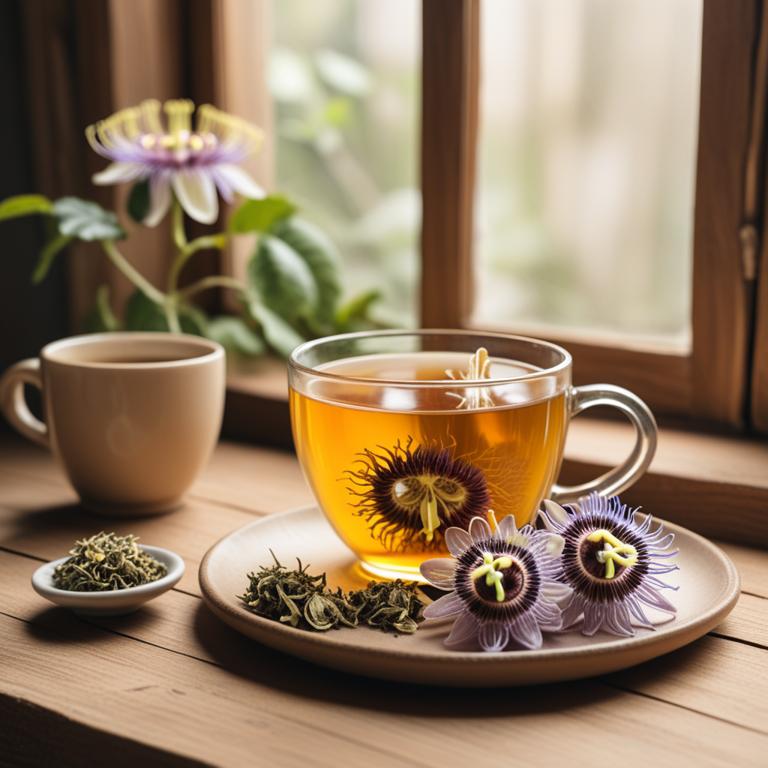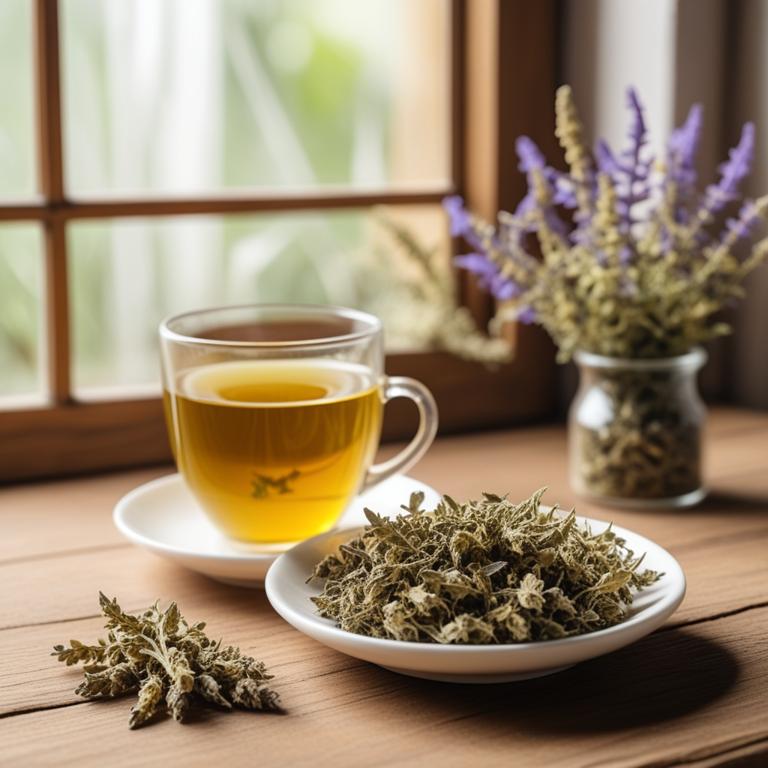9 Best Herbal Teas For Sleep Deprivation

Herbal teas for sleep deprivation are a type of herbal remedy used to treat the inability to fall asleep or stay asleep due to various factors, such as stress, anxiety, or irregular sleep schedules.
These teas offer a natural and calming approach to addressing sleep deprivation, providing numerous benefits, including reduced stress levels, improved sleep quality, and enhanced relaxation.
Some popular herbal teas used to treat sleep deprivation include chamomile, which promotes relaxation and soothes the mind, lavender, which calms the body and mind, valerian root, which regulates sleep patterns and promotes deep sleep, peppermint, which relaxes the body and reduces anxiety, and passionflower, which reduces anxiety and promotes a restful night's sleep.
Additionally, other herbal teas like lemon balm, hops, and ashwagandha have also been found to help alleviate sleep deprivation by reducing stress and anxiety levels, promoting relaxation, and regulating sleep patterns.
According to "Phytotherapy research : PTR", teas for sleep deprivation may be beneficial, with certain herbs such as Valeriana officinalis, Melissa officinalis, and others showing promise in improving sleep time, reducing sleep latency, and enhancing sleep quality.
Below there's a list of the 9 best herbal teas for sleep deprivation.
- 1. Lavandula angustifolia teas
- 2. Valeriana officinalis teas
- 3. Melissa officinalis teas
- 4. Avena sativa teas
- 5. Humulus lupulus teas
- 6. Passiflora incarnata teas
- 7. Lavandula latifolia teas
- 8. Scutellaria baicalensis teas
- 9. Cinchona officinalis teas
Also you may be interested in...
TODAY'S FREE BOUNDLE
Herb Drying Checklist + Herbal Tea Shopping List + Medicinal Herbs Flashcards
Enter you best email address below to receive this bundle (3 product valued $19.95) for FREE + exclusive access to The Aphotecary Letter.
$19.95 -> $0.00
1. Lavandula angustifolia teas

Lavandula angustifolia teas have been traditionally used to treat sleep deprivation due to their calming and soothing properties, which help to reduce stress and anxiety levels in individuals.
The bioactive constituents of this herbal preparation, including linalool and linalyl acetate, contribute to its sedative effects by promoting relaxation and regulating sleep patterns.
By promoting relaxation and reducing stress, Lavandula angustifolia teas can help to treat sleep deprivation by improving the quality and duration of sleep.
Regular consumption of these teas has been shown to provide benefits such as improved sleep quality, reduced anxiety and stress levels, and enhanced overall well-being.
Related Study
According to "Molecules (Basel, Switzerland)", Lavandula angustifolia teas for sleep deprivation may be beneficial due to its sedative and anticholinesterases properties, which can help relieve symptoms of insomnia and promote better sleep.
2. Valeriana officinalis teas

Valeriana officinalis teas have been traditionally used to treat sleep deprivation due to their sedative properties, which help to calm the mind and body, promoting relaxation and a good night's sleep.
The herbal preparation's ability to reduce anxiety and stress levels, as well as its muscle relaxant properties, make it an effective natural remedy for insomnia and other sleep disorders.
The bioactive constituents present in Valeriana officinalis teas, including valerenic acid, isovaleric acid, and valeranone, are responsible for their sedative effects, which help to regulate the sleep-wake cycle.
Regular consumption of Valeriana officinalis teas can provide numerous benefits, including improved sleep quality, reduced symptoms of anxiety and depression, and enhanced overall well-being.
Related Study
According to the study, Valeriana officinalis teas for sleep deprivation may be associated with improvements in sleep parameters, such as sleep latency and quality of sleep, but further randomised, double blind, placebo controlled trials are needed to confirm their efficacy.
3. Melissa officinalis teas

Melissa officinalis teas, derived from the leaves of the lemon balm plant, offer a natural remedy to treat the sleep deprivation ailment.
The anxiolytic and sedative properties of this herbal preparation help to calm the mind and body, promoting a restful night's sleep.
The bioactive constituents, including rosmarinic acid, apigenin, and luteolin, work together to reduce stress and anxiety, regulate sleep patterns, and improve the quality of sleep.
By incorporating Melissa officinalis teas into their bedtime routine, individuals can benefit from improved sleep quality, reduced fatigue, and enhanced overall well-being.
Related Study
According to "Journal of alternative and complementary medicine (New York, N.Y)", Melissa officinalis teas for sleep deprivation may be an effective alternative therapy, as a combination of Melissa officinalis and Nepeta menthoides significantly decreased Insomnia Severity Index (ISI) and Pittsburgh Sleep Quality Index (PSQI) scores, and increased total sleep time in individuals with insomnia.
4. Avena sativa teas

Avena sativa teas, also known as oat straw tea, have been traditionally used to treat sleep deprivation due to their calming and sedative properties.
This herbal preparation helps to treat sleep deprivation by reducing anxiety and stress, promoting relaxation, and regulating the sleep-wake cycle.
The bioactive constituents of Avena sativa, including avenanthramides and ferulic acid, have been shown to have a sedative effect on the nervous system, helping to induce a restful sleep.
The benefits of Avena sativa teas in treating sleep deprivation include improved sleep quality, reduced symptoms of insomnia, and enhanced overall well-being.
5. Humulus lupulus teas

Humulus lupulus teas, derived from the hop plant, are a natural remedy for treating sleep deprivation ailments.
The sedative properties of these teas help to induce relaxation, reducing stress and anxiety that often lead to sleep disorders.
The bioactive constituents, including flavonoids, phenolic acids, and sesquiterpenes, in Humulus lupulus teas interact with the body's GABA receptors, promoting a calming effect and regulating sleep patterns.
Regular consumption of Humulus lupulus teas can provide benefits such as improved sleep quality, reduced fatigue, and enhanced overall well-being, making it a valuable herbal preparation for those struggling with sleep deprivation.
Related Study
According to the study, Humulus lupulus teas, when used in combination with valerian, are associated with improvements in some sleep parameters such as sleep latency and quality of sleep in adults with primary insomnia.
6. Passiflora incarnata teas

Passiflora incarnata teas have been traditionally used to treat sleep deprivation due to their sedative and anxiolytic properties, which help to calm the mind and body, promoting relaxation and reducing stress levels.
The bioactive constituents of Passiflora incarnata, including flavonoids, alkaloids, and glycosides, work together to regulate the sleep-wake cycle and improve the quality of sleep.
By reducing anxiety and promoting relaxation, Passiflora incarnata teas help to treat sleep deprivation by increasing the duration and quality of sleep, leading to improved overall health and well-being.
Regular consumption of Passiflora incarnata teas has been shown to have benefits in treating sleep deprivation, including reduced symptoms of insomnia, improved sleep quality, and enhanced daytime functioning.
Related Study
According to "Current neuropharmacology", Passiflora incarnata teas for sleep deprivation may be beneficial due to their alkaloids, glycosides, flavonoids, saponins, and tannins, which have hypnotic properties and can impact benzodiazepine receptors.
7. Lavandula latifolia teas

Lavandula latifolia teas have been traditionally used to treat sleep deprivation due to their calming and soothing properties, which help to relax the mind and body.
The bioactive constituents of this herbal preparation, including linalool and linalyl acetate, have been found to possess sedative and anxiolytic effects, contributing to improved sleep quality.
By promoting relaxation and reducing anxiety, Lavandula latifolia teas help to regulate the sleep-wake cycle and alleviate symptoms of sleep deprivation.
Regular consumption of this herbal preparation has been shown to provide numerous benefits, including improved sleep duration, enhanced sleep quality, and increased daytime alertness.
8. Scutellaria baicalensis teas

Scutellaria baicalensis teas, also known as Huang Qin or Baikal Skullcap, have been traditionally used to treat sleep deprivation due to their sedative and calming properties.
The herbal preparation helps to treat this ailment by promoting relaxation, reducing stress and anxiety, and regulating the sleep-wake cycle.
The bioactive constituents of Scutellaria baicalensis teas, including baicalein and baicalin, are responsible for their sleep-promoting effects, as they have been shown to inhibit the activity of neurotransmitters that regulate sleep and wakefulness.
Regular consumption of Scutellaria baicalensis teas has been associated with improved sleep quality, reduced symptoms of insomnia, and enhanced overall well-being.
9. Cinchona officinalis teas

Cinchona officinalis teas have been traditionally used to treat sleep deprivation due to their sedative and calming properties, which help to quiet the mind and relax the body.
The alkaloids present in Cinchona officinalis teas, such as quinine and cinchonine, play a key role in promoting relaxation and reducing stress levels, thereby helping to alleviate sleep deprivation.
The bioactive constituents of Cinchona officinalis teas, including flavonoids and phenolic acids, also contribute to their sleep-promoting effects by regulating the body's circadian rhythms and improving sleep quality.
The benefits of using Cinchona officinalis teas to treat sleep deprivation include improved sleep duration, enhanced sleep quality, and reduced symptoms of insomnia and restlessness.
Related Study
According to this study, Cinchona officinalis teas for sleep deprivation may be beneficial in improving the quantity and quality of sleep due to their potential mechanisms of action related to gamma-aminobutyric acid (GABA)-synthesizing and GABA-metabolizing enzymes.